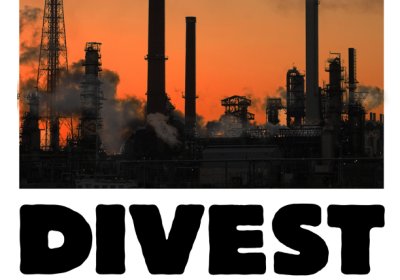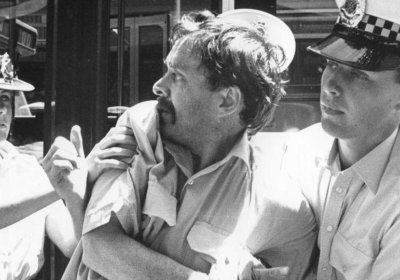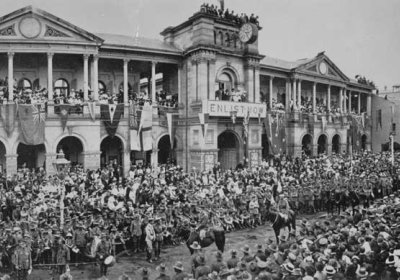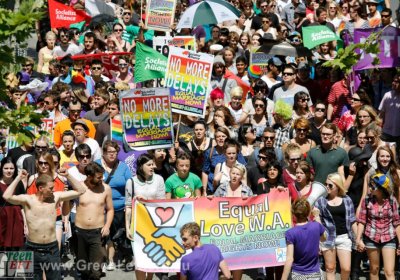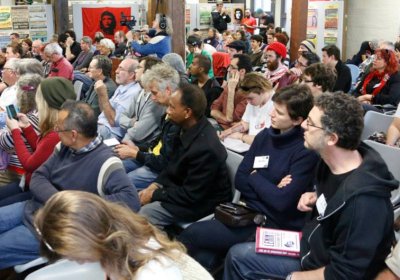Moreland council has threatened to divest from any bank that invests in fossil fuel projects.
Since 2008, the big four banks — Commonwealth, ANZ, Westpac and NAB — have invested $18.8 billion in fossil fuel projects in Australia. Moreland council has traditionally banked with the Commonwealth Bank, which provides more than $1 billion to new projects that will ship coal and gas through the Great Barrier Reef.
Dave Holmes
The conference room at the North Melbourne offices of the Electrical Trades Union was packed for a memorial for long-time socialist activist Doug Jordan who died on May 19.
“Patriotism is the last refuge of a scoundrel.” Samuel Johnson’s aphorism is well known. But what does patriotism actually mean? Is it simply a matter of liking the sunshine, the gum trees, the beaches and a certain lifestyle? Is it about being overcome with emotion when we see the Australian flag or the Anzac Day dawn service?
REAL LOVE OF COUNTRY
The movers and shakers and heavy hitters in our society — politicians, business moguls, journalists in the corporate media, and so on — are all patriotic. But we should be very cynical about this.
Victoria’s scorching January heatwave has focused a lot of attention on the problem of coping with the immediate fallout from climate change.
According to the Victorian Institute of Forensic Medicine, in the period January 13 to 23 there were 139 deaths in excess of the expected average. There were reports of homeless people being forced away from airconditioned areas as they sought relief from the relentless heat.
http://m.smh.com.au/victoria/anger-over-spike-in-deaths-during-record-victorian-heatwave-20140126-31gxb.html
The unity discussions between the Socialist Alliance and Socialist Alternative have come to an end.
In a November 3 letter on behalf of the Socialist Alternative National Executive, Mick Armstrong wrote: “The overall political projects of both organisations are not sufficiently similar to carry through a sustained and productive unity that could advance the cause of the revolutionary left in Australia and the broader class struggle.”
The Socialist Alternative letter lists four major political differences:
An important new work of labour history was launched on November 23 at the Melbourne Trades Hall. About 70 people heard author Douglas Jordan and Victoria University historian Phillip Deery mark the publication of Conflict in the Unions: The Communist Party of Australia, Politics and the Trade Union Movement, 1945-60.
The gallery was packed at the Moreland Council meeting on November 13. About 100 residents crowded into the Glenroy Senior Citizens Centre determined to make their concerns felt over several contentious planning issues.
First was Amendment C123, which, if passed, will turn parts of Coburg into a mini-CBD with 10-storey buildings permitted, irreparably changing the character of the area, sharply reducing people’s quality of life and removing residents’ right to appeal against proposed developments.
The Australian Security Intelligence Organisation (ASIO) is Australia's national security service, and promotes itself as being responsible for protecting Australia from all kinds of attacks — from terrorism to politically motivated violence.
This fairytale should not be taken seriously. Established in 1949 by the Ben Chifley ALP government, ASIO’s primary purpose has always been to carry out spying, disruption and provocation against left and progressive forces on behalf of the established order.
It is Australia’s political police — our very own secret police organisation.
This is a slightly edited text of a presentation made by Dave Holmes at the “Organising for 21st century socialism” seminar, held in Sydney on June 9. Holmes is a leading member of the Socialist Alliance in Melbourne.
***
Today I want to talk about how socialists need to work to win mass influence and how that relates to the unity process between Socialist Alliance and Socialist Alternative.
The global Occupy movement has focused the spotlight on the 1% versus the 99%. Who are the 1%? In the United States, the 400 richest individuals have as much wealth as the bottom 150 million. A similar picture applies in all the large capitalist countries.
Economy owned by the 1%
Eritreans around the world will mark the country’s national day on May 24. After an epic three-decades-long liberation struggle, in 1991 the liberation forces wrested control of their capital, Asmara, from the occupying Ethiopian army.
Two years later, a new, independent Eritrea was formally established.
But the following years have proved a bitter disappointment for the people of this small (population five million) former Italian colony on the Red Sea.
Green Left Weekly has won a victory in its free speech struggle at Brunswick’s Barkly Square shopping centre. Management stopped our stalls in late November and offered us a completely unacceptable deal.
We began our defence campaign in late February and over the next three months it developed considerable momentum. The response from shoppers was warm and extremely heartening. About 1000 people signed our petition. People were clearly outraged at the ban and concerned at the ongoing privatisation of public space.
- Previous page
- Page 4
- Next page
